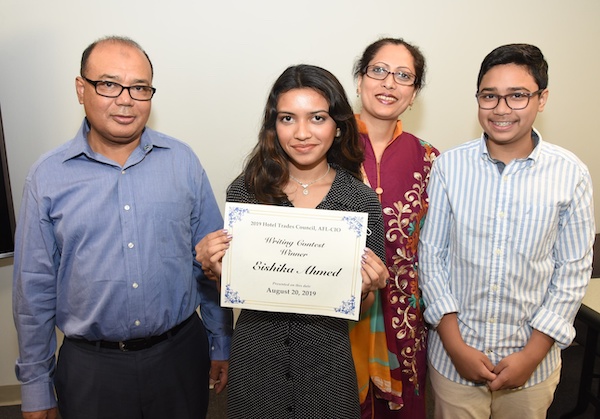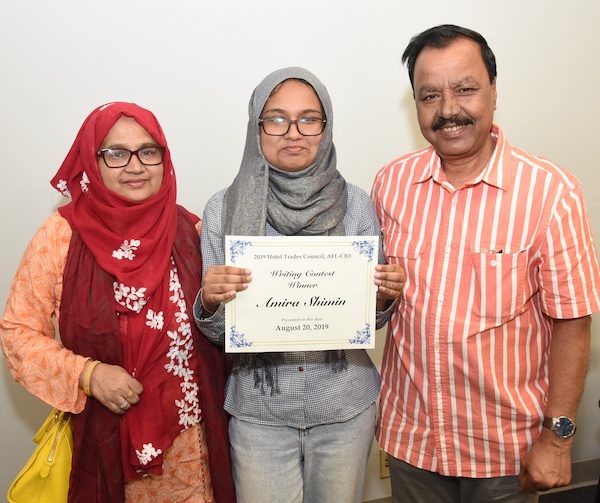Here Are the 2019 Writing Contest Winners
In an exercise that showed the enormous talent in our union family, high school students from grades 10 through 12 submitted scores of entries into the 2019 writing competition. We’re glad they did.
More than half the essays and almost half of the narratives written by the students had immigration as their subject, and many of those explained how the union benefited their families. The Second Amendment, modern day heroes and the politicizing of the U.S. Supreme Court were also popular essay topics, and there were quite a large number of poignant essays and narratives about self-discovery.
Overall, the entries showed that our union family has plenty of thoughtful, caring and intelligent students. It is obvious that the vast majority of those who participated in this competition are progressive politically, appreciate unions and care greatly about their families and their communities.
The contest had a first this year, when siblings won. Although siblings have won in the past, it had never happened before in the same year. Omar Kastrat, a Stuyvesant High School student, won a prize in last year’s competition when he tackled assault weapons in his essay on Public Safety vs. the Second Amendment. This year Omar’s prize came about as a result of a strong essay where he chose Alexandria Ocasio-Cortes as a modern day hero. In his entry Omar explained that Ms. Ocasio-Cortes’ victory as an underdog running against an entrenched incumbent who was second in line to chair the House Ways and Means Committee inspired him and others to dare to take on the political establishment.
Omar’s brother, Din Kastrat, won a prize for his superb essay on immigration. In this well thought out report, Din reviewed some of the history of immigration in the U.S. and the current situation that is so sorely exacerbated by the president of the United States. To his credit, Din also used his essay to propose solutions to some of the problems associated with immigration. As one of the judges pointed out, that’s more than Congress has done..
Priscilla Assifuah chose a modern day hero for her essay topic. She didn’t choose a politician or other famous person as a hero; instead she chose her mother. Priscilla has a rare medical condition called Tetralogy of Fallot, which is a combination of four congenital coronary abnormalities that required her to have heart surgery at the age of 11 months. In addition, there are physical limitations that come with this condition and Priscilla’s mom has had the added parental task of ensuring that her child didn’t exceed them. “It took me a long time to realize and understand the things my mom did for me and I don’t know how I could ever repay her,” Priscilla wrote. We think everyone would agree that her prize-winning essay is a good start.
As mentioned earlier, many of the entries in this year’s competition talked about immigration while others talked about appreciation of union membership. Lhakpa Sherpa did both. An immigrant from Nepal, Lhakpa describes the hardships the newly arrived Sherpa family faced in their new country and then how the union made such a positive difference in their lives. An excerpt from her essay is published in this edition.
Eishika Ahmed won a prize last year for an essay about Public Safety vs. the Second Amendment, and she won a prize again this year for telling us what she knows now that she didn’t know a year ago. In an absolutely lovely essay, Eishika told readers about her family moving this year from Elmhurst to Queens Village. This move taught Eishika something she didn’t know last year. She wrote: “What I know now that I didn’t know a year ago is how special Elmhurst was, how much I should have appreciated it more.” Indeed how often it is said that we don’t know what we’ve got until it’s gone, and Eishika’s essay certainly proved that point.
Rebekah Mirang, who won a prize last year for a fictional narrative about almost losing her brother, won a prize this year for talking about modern day heroes. Here are some of her examples of modern day heroes: Her guidance counselor, the stranger who helped her family when their car broke down on the highway, teachers who pay for students’ lunches when they don’t have enough money, union representatives who ensure the rights of employees and make sure they are treated right, the woman buying food for the homeless man, a New Yorker taking the time on the way to work to stop and give directions to tourists, a bystander defending someone getting bullied. Who could disagree that these are all examples of heroes?
Tasnim Zahid won an award last year for a narrative about self-discovery. This year she won an award for an essay about, you guessed it, self-discovery. A good way to explain this is by telling you the first two sentences of Tasnim’s essay: “As an official high school graduate, I believe that I am more than qualified to share my personal experience. I would also like to say that I have no idea what to do now.” Regarding the sudden departure from high school, Tasnim quoted a friend who said, “I never thought that I would miss something that I hated so much.” At her young age Tasnim may not have realized it, but there are lots of people twice and thrice her age who have had the same feelings. Considering the excellence of this well written essay, the judges awarded Tasnim first place in the essay category.
There were also prizes in the narrative category.
In a compelling narrative, Amira Shimin related the history of her father’s immigration to the U.S. from Bangladesh. “In 1966 he won the Diversity Visa Lottery, which allowed him to immigrate to the U.S.,” Amira wrote. Amira went on to explain all the beneficial effects her dad’s union membership had on her entire family. To that we’d like to add one other: She won a prize in the union’s writing contest.
A narrative submitted by Timothy Nguyen was aptly entitled, “From Immigrant to Citizen.” Timothy’s grandfather was an American soldier stationed in Vietnam during the war. His story tells of the perilous lives of his parents after the war and their arduous journey to America. Timothy’s narrative indeed covered the gamut from immigrant to citizen. It did it so well, it should be required reading for everyone who doesn’t understand this topical issue.
This was a writing competition, of course, and there was a particular piece of writing that did not cover any of the political issues of the day but nevertheless impressed the judges as a remarkable exercise in thought and creativity. Alexander Thaniotis tackled the question of what he knows now that he didn’t know a year ago. Telling his story in the form of a narrative, Alexander managed to be totally honest and at the same time lighthearted. It was a simple exercise, really. Alexander decided to tell the world of this major shortcoming he has, a mortifying problem; an affliction so serious that it had a temporary but nevertheless devastating impact on his life. Alexander doesn’t know how to dance. He begins his narrative with the humiliating experience of spending hours at his first real party being a wallflower, cringing at the thought of his fear of making a fool of himself on the dance floor. When he was later asked by his mom how he liked the party, he did what any self-respecting wallflower teenager would do: he lied and said he had a great time. He explained that since that traumatic experience at the party he has become a little more comfortable in his own skin, and realizes that he does better in some social settings, like smaller, controlled environments. He explained that he has learned an important lesson since that horrible first party experience: that it’s perfectly OK not to be a social butterfly in every setting possible. Alexander concluded his entertaining and enlightening introspective by saying he’s glad with how far he has come on this journey of self-discovery, adding that he believes he’s missing a single, vitally important step, which he expresses with the final words of his narrative: “I should probably start taking some dance lessons,” This bright, candid and truly refreshing piece of writing impressed the judges enough to award Alexander first place overall and the top prize of $3,000.
We had a first in this year’s writing contest. Although siblings had won in separate years in the past, 2019 was the first time siblings won in the same year. Here, brothers Omar and Din Kastrat accept their prizes from Local 6 Business Agent Nick Ruiz. Also present is Omar and Din’s mom, Amela Kastrat.
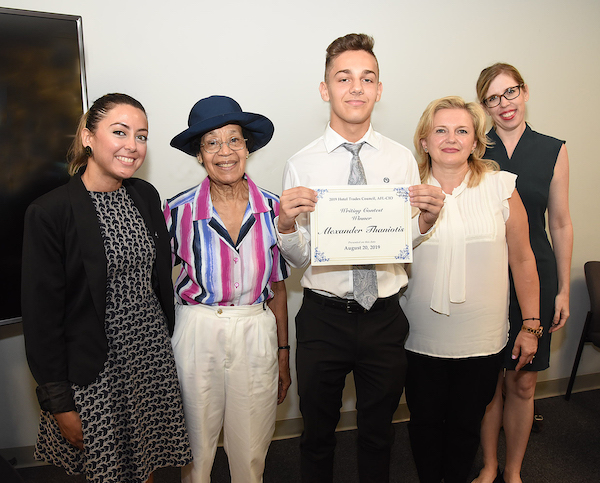
Here is the grand prize winner! Alexander Thaniotis was awarded a $3,000 prize for best overall entry in the writing contest. He and his mom, Magdalena Thaniotis, are congratulated here by HTC Assistant Director of Organizing Arisha Sierra-Blas, Evelyn Jones Rich and HTC Director of Organizing Julia Rybak.
Eishika Ahmed, another two-time prize winner, and family members.
Here Is What Writing Contest Winners Wrote . . .
As noted elsewhere in this edition, many of the students who participated in this year’s writing contest chose immigration as their topic and many of those also explained the beneficial effect the union has had on their lives. Here are excerpts from some of them:
“When we first arrived in America we had nothing. Looking around now, I see how lucky I am because the union was our ticket out of poverty. It has supported us with family healthcare, a retirement plan, job security and so much more. I’m writing this essay to acknowledge how powerfully the union has impacted my life. I usually don’t participate in writing competitions but when my father showed me this one I decided to do so.” — Lhakpa Sherpa
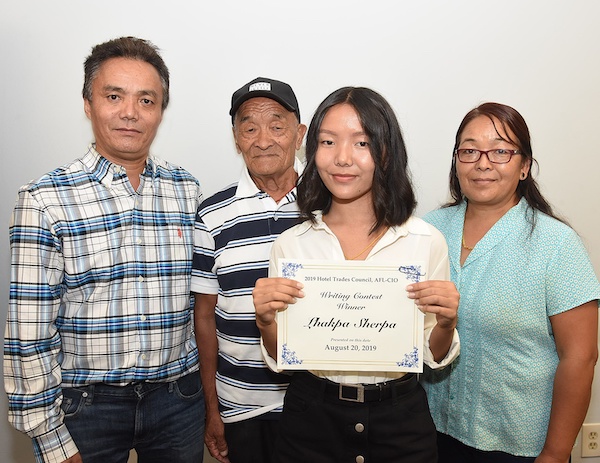
Lhakpa Sherpa and family members.
“Living in the USA was difficult when my father arrived. He had no experience working in an urban environment, had no contacts to help him and couldn’t speak the language. He was, however, able to secure a union job and was welcomed into Local 6, where he became pleasantly surprised at the stark contrast between working conditions in America and Vietnam. While he worked, my mother attended school and earned her degree in Business. Today, she holds a good job with a major bank, although, ironically, my father’s health benefits through the union are more comprehensive than hers.” — Timothy Nguyen
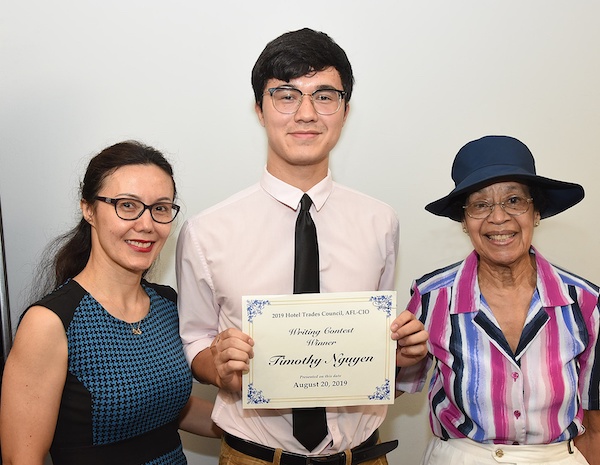
Timothy Nguyen and his mom are congratulated by Evelyn Jones Rich, the former Executive Director of the Shelley and Donald Rubin Foundation
“My father tells me that moving to the U.S. was, in a way, when his life truly began. When my mother and sister moved to the U.S. to join him, things got a little better. But what really changed his life in America was when he got a job in the Hilton Hotel. It wasn’t just any job. It was a union job. To say that this job dramatically changed not just his life but the lives of our entire family would be an understatement. My father no longer had to cower in front of his bosses. He could breathe at work. For my father the union wasn’t just an entity that made his life better, it was a movement, a community of him and his fellow workers fighting to level the playing field. For me the union means braces, glasses and regular check-ups. For my family it meant not being burdened with insurmountable debt when my mother had to have open heart surgery.” — Amira Shimin
Amira Shimin is seen here with her parents.


.JPG)
